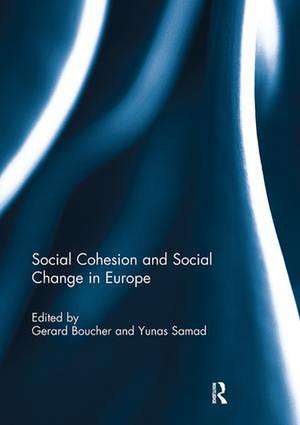Social Cohesion and Social Change in Europe
Editat de Gerard Boucher, Yunas Samaden Limba Engleză Paperback – 16 iun 2017
This book argues that perceived crises in social cohesion in Europe have more to do with the consequences of structural change rather than the failure of multiculturalism and immigration. It looks at the relationship between social cohesion and social change in Europe, focusing on the European Union as a whole, and on urban areas such as Paris, France and Bradford, UK. This book was originally published as a special issue of Patterns of Prejudice.
Preț: 325.34 lei
Preț vechi: 386.78 lei
-16% Nou
Puncte Express: 488
Preț estimativ în valută:
62.27€ • 67.67$ • 52.34£
62.27€ • 67.67$ • 52.34£
Carte tipărită la comandă
Livrare economică 21 aprilie-05 mai
Preluare comenzi: 021 569.72.76
Specificații
ISBN-13: 9781138295322
ISBN-10: 1138295329
Pagini: 144
Dimensiuni: 174 x 246 mm
Greutate: 0.45 kg
Ediția:1
Editura: Taylor & Francis
Colecția Routledge
Locul publicării:Oxford, United Kingdom
ISBN-10: 1138295329
Pagini: 144
Dimensiuni: 174 x 246 mm
Greutate: 0.45 kg
Ediția:1
Editura: Taylor & Francis
Colecția Routledge
Locul publicării:Oxford, United Kingdom
Public țintă
Postgraduate and UndergraduateCuprins
Introduction: social cohesion and social change in Europe 1. European social cohesions 2. Islamophobia, community cohesion and counter-terrorism policies in Britain 3. Cohesion without participation: immigration and migrants’ associations in Italy 4. Community cohesion without parallel lives in Bradford 5. Ethnicity and social cohesion in the post-Soviet Baltic states 6. The social geography of ethnic minorities in metropolitan Paris: a challenge to the French model of social cohesion?
Recenzii
"It is of paramount importance to mention the significance of this book, even though its articles were completed in 2013...this book constitutes a useful tool for advanced students and researchers in the field of social sciences including everyone who attempts to explore social cohesion as a spectral phenomenon."
Christos Orfanidis, Aristotle University of Thessaloniki, Greece. Nordic Journal of Migration Research (2016)
Christos Orfanidis, Aristotle University of Thessaloniki, Greece. Nordic Journal of Migration Research (2016)
Descriere
Social cohesion can be used to explain the socio-cultural consequences of structural changes related to industrialization and modernity. In Europe, these changes have often led to more insecurity and material inequalities between people. This book argues that perceived crises in social cohesion in Europe have more to do with the consequences of structural change rather than the failure of multiculturalism and immigration, examining social cohesion on a national level, whilst also providing specific city-level analysis. This book was originally published as a special issue of Patterns of Prejudice.
